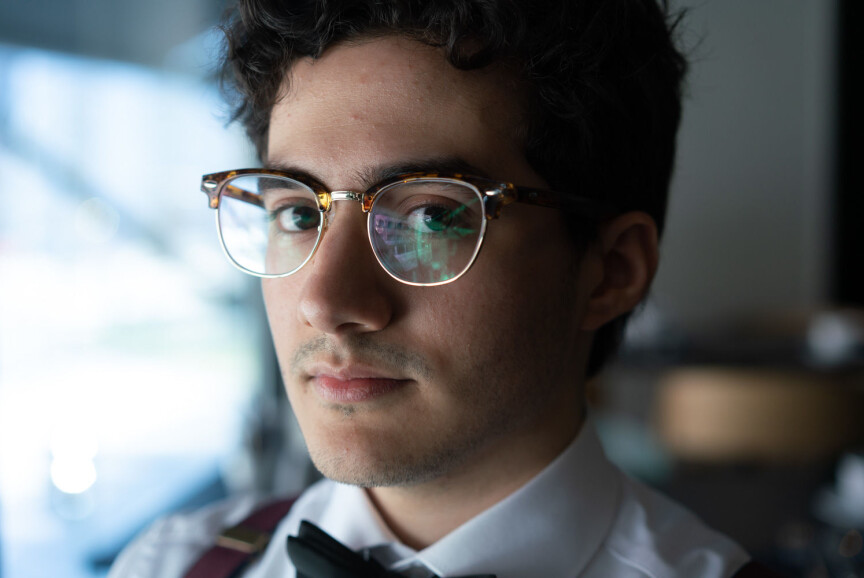
Stories: «Learning to be Kinder, Nicer and More Loving»
The Venezuelan. Living your life scared, not knowing if the next day you’d lose someone or you’d lose yourself, that’s not really living, Jose de Pool writes about his experience as an exchange student.
OBS! Denne artikkelen er mer enn tre år gammel, og kan inneholde utdatert informasjon.
I follow a simple and yet extremely complex idea in my life: «When something bad happens in your life, you can choose to dwell on it and be stuck. Or you can choose to learn from it, to let it shape you into someone who is kinder, nicer, more loving. It's on you.»
Needless to say, I am someone who has had to learn a lot in a very short 22 years. But because of my experiences, I also believe I am someone who is kind, nice and loving. Ever self-improving. Both a masterpiece and a work in progress at the same time.
I grew up in Venezuela, a very oil-rich country in South America. Those who know Venezuela’s history and current situation know that it is a country full of crime, death and famine. But the complexity of daily life there is greater than saying those three words.
Being held at gunpoint, being shot at, sexual abuse, losing people that you love, these are all things I have personally experienced, all before becoming an ‘adult’... Kinder, nicer, more loving.
There came a point in my life when I decided to love the world with the same intensity as it didn’t love me at times.
Jose de Pool
There’s one of those things I experienced in particular that filled me with shame and hatred at the world for most of my teenage years. It also caused strained relationships with various family members. Yet there came a point in my life when, with help, I decided to let go of that anger, that shame, that hatred. Where I decided to love the world with the same intensity as it didn’t love me at times.
But how do you make it in Venezuela? Well, you do it by shielding yourself from the reality of what life in your country is like, by using hope. By becoming the living embodiment of hope.
But the truth is, when I talk about my time there, I don’t think I lived in Venezuela. I think I survived there. Because living your life scared, not knowing if the next day you’d lose someone or you’d lose yourself, that’s not really living.
That’s not to say I didn’t have those simple coming-of-age struggles. Puberty hits everyone like a train. Change of schools. Friendships, romances, summer flings. Doesn’t Highschool just suck? The whole thing.
And the pressure. See, I’ve always been an overachiever, going so far as to skip grades in primary school, something that rarely happens in my country. My perception of it was, the more I achieved, the more pressure there was. The more eyes looking, waiting to see what I’d do next. Failure was not an option. Mistakes were not an option. Not in my house. We are great, we are royal, we do not sway. «You are extraordinary», they’d say.
And you know, for a little not-so-humble brag, I was. I am. I work as hard I can for as long as I can stand it, and I love it. I love working more than being at home. I love working more than partying. But my journey of self-improvement only started in Venezuela.
And then comes Norway. You amazing, beautiful, as-rare-as-a-unicorn, country. It took me a year and a half to prepare for you. I remember sitting around the table with my family, having lunch and me blurting out «I am going to Norway to study Biology» after spending the night before researching how to do it all. And my family laughed and said «Sure you are». The more I talked about it, the more annoyed they seemed to get. They didn’t think it was possible, no one did. It was an expensive, difficult, and very long process.
Failure isn’t failing
Jose de Pool
I fought tooth and nail for it. All the way for a year and half. In that time I was also teaching English and I was attending lectures at a top private university to become a business administrator. And well, look at me now. I fight for it all the way still. I’m a biologist. I am in Norway. And I am the freaking national president of ISU Norway.
Do you want to know the nicest thing I found out? Failure isn’t failing the first time. It’s giving up. Accepting that we don’t always get it right the first time has been one of the healthiest choices of my life. Realising that in order for me to work, to be great, to be me, I needed to take time to also unwind and relax, was another very important realisation.
And you know, the struggle is real, yes, but I didn't do it all by myself. I have an amazing group of friends. Somehow these Norwegian people who I had been told were cold and distant are, at least when it comes to my friends, accepting and returning my hugs eagerly, and accepting kisses on top of their head, something we do in Venezuelan culture for the closest to us.
Here’s the thing about moving across the world and starting a whole new life. It’s scary. And it isn’t. It’s exciting. My excitement trumped my fear throughout the year and a half of planning. I was so, so excited that I could not feel the fear. There was none.
I say this with all of me. THANK YOU. To Norway, to my friends, to my university, to my ‘persons’, to ISU.
You see, I planned everything. I planned which courses I was going to take, how I would save money on food, which master programs I was going to apply for once I was done, how many hours I was going to study per week, what I would do to get a job quickly. I planned every single, little detail.
Except for people. I never planned to get to know all the amazing, strong, kind people I’ve met until now. Because of them, it wasn’t hard at all to adapt to a new country. Because of them, I found my family and feel at home in Norway.
Having them in my corner means that I am not worried about lacking a support system. That I am not alone. That halfway across the world my family doesn’t have to worry about me being okay or not, because they know how great the people I have here are.
My life abroad, a life that I actually get to live, is filled with people from all over the world. It’s filled with salty air, bonfires, barbecues at the lake, cabin trips, warm sweaters, surprise parties, walks along the river, Mario kart, walking on frozen lakes, Halloween parties, playing hide and seek late at night in the university, Venezuelan blessings (which are the kisses on the top of the head), and so much more.
And I am forever thankful for that. I am kinder, nicer, more loving because of that. Because I couldn’t have planned it and it’s still my reality. I wouldn’t change it for the world. And, let’s be honest, would you?
This story was first published on ISU Norway's blog.









Logg inn med en Google-konto, eller ved å opprette en Commento-konto gjennom å trykke på Login under. (Det kan være behov for å oppdatere siden når man logger inn første gang)
Vi modererer debatten i etterkant og alle innlegg må signeres med fullt navn. Se Khronos debattregler her. God debatt!